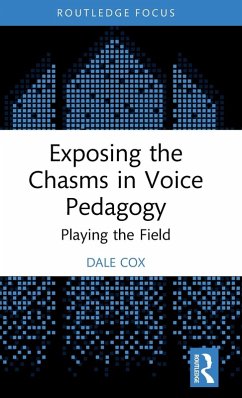This concise book critically examines the intersection of power, privilege, and classical music in higher education through an extensive study of the experiences, training, and background of teachers of musical theatre singing.
Mapping the divides within the voice pedagogy field, it shows how despite the growth of non-classical programmes, the teaching of vocal music in the United States continues to be structurally dominated by Western classical music. Drawing on extensive fieldwork and observations of practicing instructors, the author argues that current voice pedagogy training's classical-centred approach fails to prepare instructors to teach the range of vocal styles needed in the contemporary musical theatre profession. Combining a critical review of existing practices with proposals for change, this book sheds light on a key problem in voice pedagogy today.
Based on field research and drawing on both Shulman's signature pedagogies theory and Bourdieu's concepts of habitus, capitals, practice, and field, this book will be useful for scholars, researchers, and practitioners of voice pedagogy, higher music education, performance education, cultural studies, music, musical theatre, and theatre studies.
Mapping the divides within the voice pedagogy field, it shows how despite the growth of non-classical programmes, the teaching of vocal music in the United States continues to be structurally dominated by Western classical music. Drawing on extensive fieldwork and observations of practicing instructors, the author argues that current voice pedagogy training's classical-centred approach fails to prepare instructors to teach the range of vocal styles needed in the contemporary musical theatre profession. Combining a critical review of existing practices with proposals for change, this book sheds light on a key problem in voice pedagogy today.
Based on field research and drawing on both Shulman's signature pedagogies theory and Bourdieu's concepts of habitus, capitals, practice, and field, this book will be useful for scholars, researchers, and practitioners of voice pedagogy, higher music education, performance education, cultural studies, music, musical theatre, and theatre studies.

